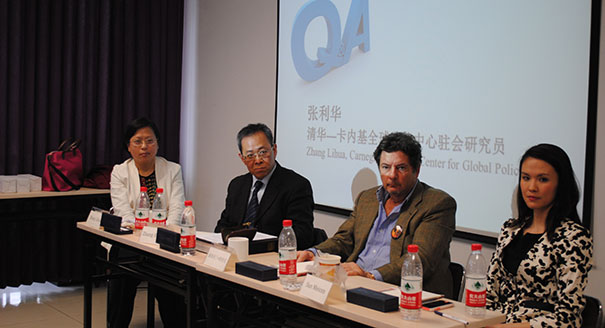Registration
You will receive an email confirming your registration.
Both China and Greece enjoy centuries-old cultural heritages that respectively are important sources of Eastern and Western traditions. As people-to-people exchanges between China and Europe become more frequent, a clear understanding of how historical legacies influence contemporary soft power and cultural diplomacy is vital to strong Sino-European relations.
Carnegie–Tsinghua’s Zhang Lihua hosted a panel discussion with leading Chinese and Greek experts on the potential of cultural exchanges between the two countries. They examined how longstanding societal traditions affect prospects for Sino-Greek cultural cooperation.
Discussion Highlights
Cultural Continuity: Panelists noted that both China and Greece have longstanding historical legacies that stretch back for millennia and established cultural customs that have preserved societal continuity across many generations. They suggested that both countries take great pride in their rich heritage and share a deep respect for each other’s cultural traditions in the face of rapid change and globalization in today’s world.
Preserving Literary Traditions: Panelists agreed that ancient Greek and Chinese societies both placed high value on written records to document their intellectual heritage. The Academy of Plato’s library in Greece and a similar institution in imperial China collected and disseminated important texts, which contributed to both civilizations’ rich literary traditions. Both Greece and China pursued knowledge in a comprehensive way that incorporated history, religion, and science. Participants concluded that these records are a valuable resource for modern researchers exploring parallels between classical Greek and Chinese thought.
The Challenge of Cultural Preservation: China and Greece both face challenges to safeguarding and promoting their cultural traditions, panelists said. They pointed out that many Greek and Chinese students are choosing education programs and career paths in business and the natural sciences, while fewer are receiving an education in classical languages and the liberal arts, which are central to both countries’ cultural heritages. Current economic conditions in Greece are reflected in smaller government budgets for cultural programs, which has limited the scope of initiatives for cultural preservation and exchange.
Advancing People-to-People Collaboration: Panelists suggested that expanding Sino-Greek cultural cooperation would help to deepen economic and people-to-people exchanges between the two countries. Participants pointed out that academic researchers from both countries could benefit greatly from joint studies to examine Greek and Chinese textual records, which may highlight shared cultural insights and foster mutual understanding. Meanwhile, educational exchanges between Greek and Chinese universities also are becoming more popular.
State Support for Strong Bilateral Ties: Last June, Chinese Premier Li Keqiang visited Athens and pledged to bolster Sino-Greek cultural ties, panelists reported. During his trip, the Chinese and Greek governments agreed to establish cultural centers in each other’s capitals. Participants asserted that China’s New Silk Road initiative is another promising avenue not only for cooperating economically, but also for expanding cultural interactions between Greece and China.
Zhang Lihua
Zhang Lihua is a resident scholar at the Carnegie–Tsinghua Center for Global Policy where she examines how China’s core values affect Chinese foreign policy.
Konstantinos Staikos
Konstantinos Staikos is a Greek architect and author of several books, including The Great Libraries: From Antiquity to the Renaissance, which examines the historical development of libraries in Europe and the Mediterranean.
Zhang Xushan
Zhang Xushan is a professor in Tsinghua University’s department of history. His research interests include world history and historiography.
Wang Xiaochao
Wang Xiaochao is a professor in Tsinghua University’s department of philosophy and former director of the university’s Center of Morality and Religion.
Sun Meicen
Sun Meicen is a doctoral student of international relations at the University of Pennsylvania with a focus on international security issues.
